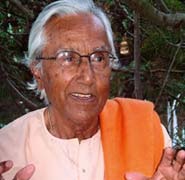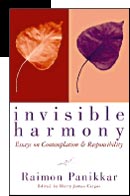

el sitio oficial


Invisible harmony: Essays on Contemplation & Responsibility
One of the tenets that distinguishes Panikkar’s thought from that of most of his contemporaries is his perception of a hidden harmony in the whole of reality, a harmony “perceived in and through the discordant voices of human traditions”. Many classical thinkers shared this perception. As Heraclitus wrote twenty-five centuries ago, “the hidden harmony is stronger than the visible one” (fragment B 54 Diels and A 20 Colli). Panikkar links this perception with an attitude of cosmic confidence and compares it to musical harmony: “There is no harmonical accord if there is no plurality of sounds, or if those sounds coalesce in one single note. Neither many nor one, but concord, harmony”.
This collection brings together the revised versions of essays originally published between 1973 and 1990, including some of Panikkar’s most important texts on pluralism and on the invisible harmony underlying the plurality of the world. These include, among others, “The Myth of Pluralism: The Tower of Babel”, “The Pluralism of Truth”, “Is History the Measure of Man?” and “The Invisible Harmony: A Universal Theory of Religion or a Cosmic Confidence in Reality?”, as well as his influential article “Is the Notion of Human Rights a Western Concept?”, where he shows that human rights are indeed a concept originating in Western thought (which doesn’t mean we shouldn’t defend them) and that they have “homeomorphic equivalents” in other cultures, like the Indian notion of svadharma.
Against a “threefold reductionism” that has been prevalent in Western thought, Panikkar claims that Reason is not the whole of Logos, Logos is not the whole of Man, and Humanity is not the whole of Reality. He criticizes the attempts to find universal theories as revealing a “felt need to have everything under control”. For Panikkar, “Each being, not excluding a possible Supreme Being, presents an opaque remnant, as it were, a mysterious aspect that defies transparency. This is precisely the locus of freedom—and the basis of pluralism”.
Pluralism, for Panikkar, is more than an instance of perspectivism: “To acknowledge different perspectives upon a question only shifts the problem because we then have to begin all over again to discuss what the right perspective is for that particular case, and so forth and so on. Pluralism is not the mere justification for a plurality of opinions, but the realization that the real is more than the sum of all possible opinions». Pluralism means “something more than sheer acknowledgement of plurality and the mere wishful thinking of unity”. Pannikar explains that thinking, so to say, “covers the totality of Being only from the exterior”. In this sense, reality itself cannot be said to be self-intelligible. Reality itself is pluralistic, and we are also part of it. Therefore, “we are not only spectators of the Real, we are also co-actors and even co-authors of it. This is precisely our human dignity”.
Jordi Pigem
